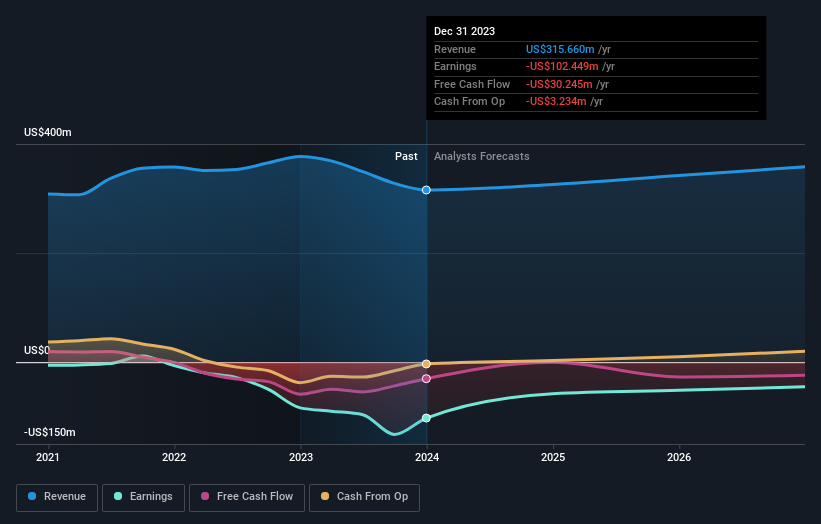- United States
- /
- Medical Equipment
- /
- NasdaqGS:INGN
Inogen, Inc. (NASDAQ:INGN) Just Reported, And Analysts Assigned A US$6.50 Price Target
There's been a major selloff in Inogen, Inc. (NASDAQ:INGN) shares in the week since it released its annual report, with the stock down 29% to US$6.65. Revenues were in line with expectations, at US$316m, while statutory losses ballooned to US$4.42 per share. Following the result, the analysts have updated their earnings model, and it would be good to know whether they think there's been a strong change in the company's prospects, or if it's business as usual. We thought readers would find it interesting to see the analysts latest (statutory) post-earnings forecasts for next year.
See our latest analysis for Inogen

Taking into account the latest results, the current consensus from Inogen's four analysts is for revenues of US$325.7m in 2024. This would reflect a credible 3.2% increase on its revenue over the past 12 months. Losses are predicted to fall substantially, shrinking 43% to US$2.50. Before this latest report, the consensus had been expecting revenues of US$333.8m and US$2.27 per share in losses. While this year's revenue estimates dropped there was also a noticeable increase in loss per share expectations, suggesting the consensus has a bit of a mixed view on the stock.
The average price target fell 19% to US$6.50, implicitly signalling that lower earnings per share are a leading indicator for Inogen's valuation. The consensus price target is just an average of individual analyst targets, so - it could be handy to see how wide the range of underlying estimates is. The most optimistic Inogen analyst has a price target of US$7.00 per share, while the most pessimistic values it at US$6.00. Still, with such a tight range of estimates, it suggeststhe analysts have a pretty good idea of what they think the company is worth.
Taking a look at the bigger picture now, one of the ways we can understand these forecasts is to see how they compare to both past performance and industry growth estimates. One thing stands out from these estimates, which is that Inogen is forecast to grow faster in the future than it has in the past, with revenues expected to display 3.2% annualised growth until the end of 2024. If achieved, this would be a much better result than the 0.8% annual decline over the past five years. Compare this against analyst estimates for the broader industry, which suggest that (in aggregate) industry revenues are expected to grow 7.8% annually for the foreseeable future. Although Inogen's revenues are expected to improve, it seems that the analysts are still bearish on the business, forecasting it to grow slower than the broader industry.
The Bottom Line
The most important thing to take away is that the analysts increased their loss per share estimates for next year. Unfortunately, they also downgraded their revenue estimates, and our data indicates underperformance compared to the wider industry. Even so, earnings per share are more important to the intrinsic value of the business. The consensus price target fell measurably, with the analysts seemingly not reassured by the latest results, leading to a lower estimate of Inogen's future valuation.
Following on from that line of thought, we think that the long-term prospects of the business are much more relevant than next year's earnings. We have forecasts for Inogen going out to 2026, and you can see them free on our platform here.
Don't forget that there may still be risks. For instance, we've identified 2 warning signs for Inogen that you should be aware of.
New: AI Stock Screener & Alerts
Our new AI Stock Screener scans the market every day to uncover opportunities.
• Dividend Powerhouses (3%+ Yield)
• Undervalued Small Caps with Insider Buying
• High growth Tech and AI Companies
Or build your own from over 50 metrics.
Have feedback on this article? Concerned about the content? Get in touch with us directly. Alternatively, email editorial-team (at) simplywallst.com.
This article by Simply Wall St is general in nature. We provide commentary based on historical data and analyst forecasts only using an unbiased methodology and our articles are not intended to be financial advice. It does not constitute a recommendation to buy or sell any stock, and does not take account of your objectives, or your financial situation. We aim to bring you long-term focused analysis driven by fundamental data. Note that our analysis may not factor in the latest price-sensitive company announcements or qualitative material. Simply Wall St has no position in any stocks mentioned.
About NasdaqGS:INGN
Inogen
A medical technology company, develops, manufactures, and markets respiratory health products in the United States and internationally.
Undervalued with excellent balance sheet.
Similar Companies
Market Insights
Community Narratives




